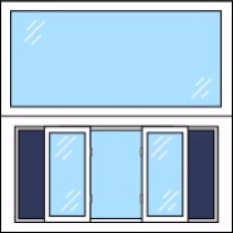Choosing the right entry door isn’t just about hinges and handles — it’s about how you live, how you host, and how you want your home to feel when someone steps inside. Your front door is the handshake of your home. So, do you go bold with double doors, or classic with a single?
This guide walks you through the real-life pros, cons, and nuances of both options — not just what they are, but how they work in the day-to-day of modern living.
Key Takeaways
- Single doors are simpler, more secure, and easier to maintain — ideal for traditional homes, tighter spaces, and energy-conscious households.
- Double doors create dramatic curb appeal and wide access but require more planning, space, and investment.
- Double doors are more prone to drafts and alignment issues, especially if not professionally installed.
- Single doors are more stable and secure by design — fewer moving parts, tighter seal, and easier locking.
- Choose based on how you live, not just how it looks — consider furniture clearance, traffic flow, and day-to-day function.
- For best results, always measure your space carefully and confirm slab vs frame size before ordering.
- Still unsure? A quick consult with a contractor can save you costly mistakes later.
Visual Impact & Style Differences
If curb appeal matters to you (and let’s be honest, it should), your door choice sets the tone.
Double doors are symmetrical, grand, and ideal for homes with scale. Want to wow guests before they even ring the bell? Double doors will do it.
Glass-paned versions (like French double doors) can flood your entryway with natural light, turning a dark foyer into a welcoming statement.
Single doors, by contrast, are clean, minimal, and timeless — they complement modestly sized homes or facades with a lot going on. When paired with sidelights or transom windows, a single door can still feel every bit as refined.
Expert insight: Don’t just think “what looks good on a brochure”. Step back from your house — does the scale of your entryway match the visual weight of double doors? If not, a single door will often feel more balanced and intentional.

Double Door vs Single Door: Space Requirements to Consider
Space is where reality often clashes with design dreams.
Double doors typically require 5–6 feet of wall width and generous swing clearance — inside or outside. They need structural support above, and the interior space to accommodate two open panels without blocking furniture, coat racks, or foot traffic.
Double doors are also more prone to drafts — especially if the centre seam or weatherstripping isn’t properly sealed.
Single doors are far more forgiving. A standard 36-inch opening fits into tight spaces, requires fewer structural changes, and plays nicely with narrower porches or compact interiors.
Single doors are more stable and secure by design — less surface area, fewer moving parts, and one solid frame.
Personally, I don’t like double doors — not because they aren’t beautiful, but because they tend to come with more problems than most homeowners expect.
Pro tip: If your front entry opens directly into a hallway or lounge room, think carefully about how traffic flows. Two swinging doors can be beautiful — but annoying — if they’re constantly in the way.
Which Offers Better Functionality and Access?
This is where lifestyle really kicks in.
- Double doors are unbeatable for access. Moving a couch? A fridge? Hosting 20 people for dinner? Open both panels and you’ve got a breezy, wide passage for people and things.
- For families with prams, mobility needs, or frequent large-item deliveries (hello online shopping), that extra width makes daily life easier.
- Natural light is also a huge win. Glazed double doors let light pour in — making your interior feel larger, brighter, and more connected to the outdoors.
- Single doors offer simplified operation. One door, one lock, one motion — and you’re in. Elderly homeowners or anyone with mobility challenges may prefer this lower-effort solution.
Before deciding between single or double, it helps to understand how double doors are built and function — see our what is a double door article.
Single Door vs Double Door: Security, Durability & Maintenance
Let’s bust a myth: double doors can be secure — but only if done right.
- Single doors are inherently simpler to secure. One frame, one locking point, fewer potential gaps for drafts or intruders. They also tend to be better sealed, making them more energy-efficient in harsh climates.
- Double doors, especially older or poorly installed ones, can suffer from a weak centre seam if the astragal (vertical strip between doors) and locking system aren’t up to scratch.
Expert advice: Invest in high-quality multipoint locks and strong deadbolts if you’re going the double route. And have them installed professionally — that centre seam needs to align perfectly to stay tight and secure over time.
Maintenance also differs:
- One door = fewer parts, easier upkeep.
- Two doors = double the hinges, twice the sealing surfaces, and more moving parts to check seasonally.
If you’re leaning toward double doors but unsure about styles, compare French doors with other double door types. It might help clarify the look and function that fits best.

Cost Comparison & Long-Term Value
Let’s talk money — both now and later.
|
Feature |
Single Door |
Double Door |
|
Initial Cost |
Lower (from $...) |
Higher (from $...) |
|
Installation |
Simple |
More complex, may require structural work |
|
Energy Efficiency |
Better seal |
Depends on glass and sealing at the centre |
|
Security |
Easier to secure |
Needs more advanced hardware |
|
Maintenance |
Lower |
More upkeep |
|
Accessibility |
Narrower |
Ideal for large items and mobility aids |
|
Curb Appeal |
Understated elegance |
Grand, luxurious feel |
While double doors are more expensive up front, they can boost resale value in upscale areas. They make a home feel more open, luxurious, and “complete” in higher-end markets.
Single doors are more economical and practical for the majority of homes — especially where wall space, energy use, and simplicity matter.
Double doors look impressive — but is the extra width worth it? We break it down in our double front doors pros and cons guide.
Double Door vs Single Door: Making the Right Choice for Your Home
There’s no one-size-fits-all winner here. Your decision should reflect your home’s architecture, how you live, and what you value most.
Choose a single door if:
- You have a smaller or more traditional home
- You want better security and a more stable frame
- Energy efficiency and security are top priorities
- You want lower upfront and ongoing costs
Opt for double doors if:
- You want a dramatic entry statement
- Your layout needs wider access (e.g. for entertaining or mobility)
- You're renovating or building a home where scale and luxury matter
Still not sure? Reach out for a quick consultation. I can help assess your space, guide you through available styles, and make sure your new doors — single or double — are a perfect fit for your home and your lifestyle.













